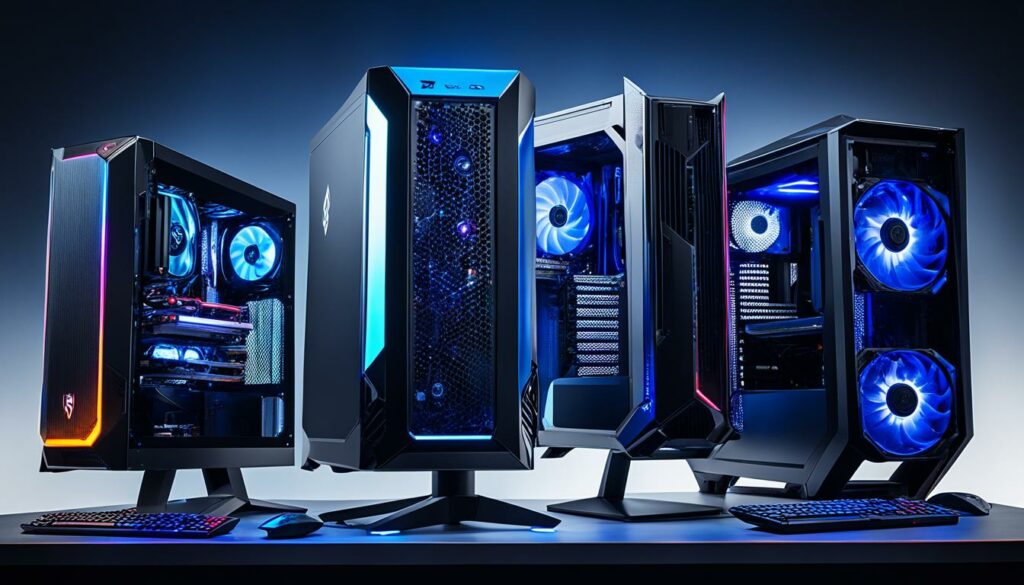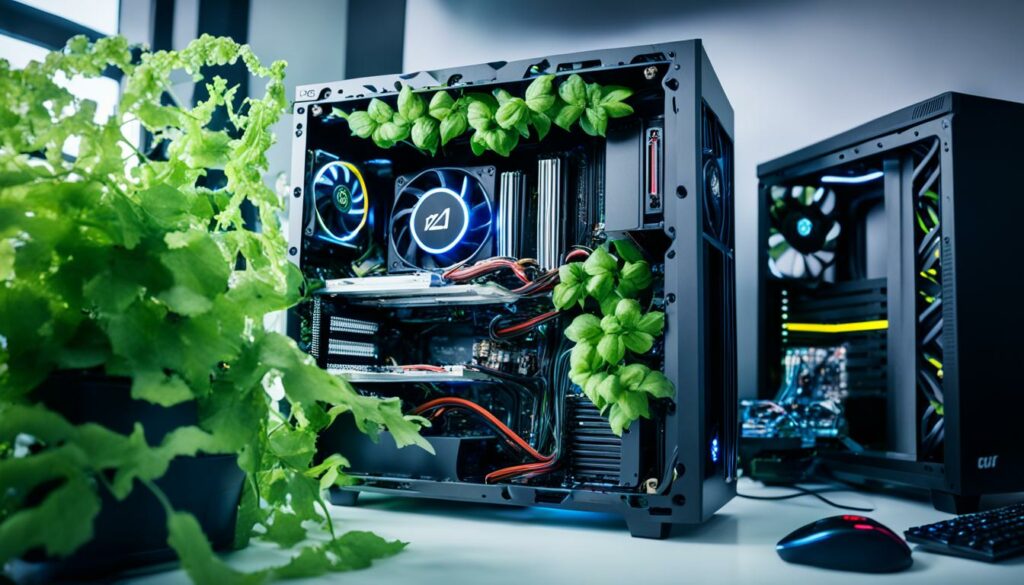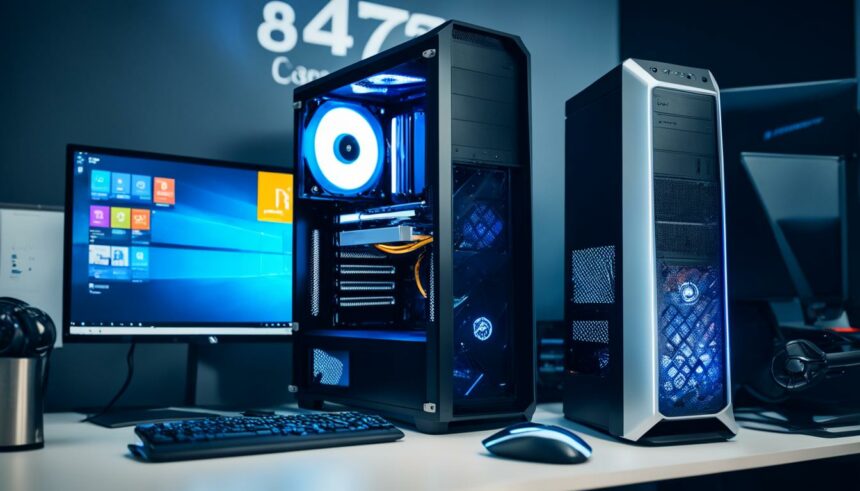Are you wondering how long a gaming PC lasts? The lifespan of a gaming PC can vary depending on several factors. In this article, we will explore the durability of gaming PCs, including how long they typically last and what can affect their lifespan.
Gaming PCs are built to handle the demands of graphically intensive games. However, their longevity is influenced by various factors, such as maintenance, game selection, and component upgrades. By understanding these factors, you can ensure that your gaming PC lasts as long as possible.
When it comes to the lifespan of a gaming PC, proper care and maintenance are crucial. Regularly cleaning your PC to remove dust and debris helps prevent overheating and ensures optimal performance. Additionally, playing a mix of graphically demanding and less demanding games can reduce strain on the components.
Investing in high-quality components designed for gaming is another way to increase the lifespan of your gaming PC. These components are built to withstand the demands of modern games and offer better performance and durability. Avoiding overclocking, which can lead to overheating and premature component failure, is also recommended.
Upgrading your gaming PC’s components as needed can further extend its lifespan. By keeping up with advancements in technology, you can ensure that your PC remains capable of running the latest games smoothly. Regularly updating drivers and software is also important for optimal performance and compatibility.
While the average lifespan of a gaming PC is typically around 2 to 5 years, your PC can last even longer with proper care and regular upgrades. By following maintenance tips and staying up-to-date with the latest components, you can enjoy gaming on your PC for many years to come.
Key Takeaways:
- The lifespan of a gaming PC depends on factors such as maintenance, game selection, and component upgrades.
- Regularly cleaning your gaming PC and playing a mix of graphically demanding and less demanding games can help extend its lifespan.
- Investing in high-quality components designed for gaming can improve durability and performance.
- Avoid overclocking, as it can lead to overheating and premature component failure.
- Upgrading components as needed and staying up-to-date with technology can ensure that your gaming PC remains capable of running the latest games.
Factors Affecting Gaming PC Longevity
The lifespan of a gaming PC depends on a variety of factors that can impact its longevity and performance. By understanding these factors and implementing proper maintenance, you can ensure that your gaming PC lasts for a longer time and delivers optimal gaming experiences.
Proper Maintenance: Regular Cleaning
One of the key factors affecting the longevity of a gaming PC is proper maintenance, which includes regular cleaning to remove dust and debris. Over time, dust accumulates on the internal components of your PC, affecting their performance and causing overheating issues. By cleaning your gaming PC regularly, you can prevent these problems and extend its lifespan. Make sure to use compressed air or an antistatic brush to clean the fans, heatsinks, and other components without causing any damage.
Game Selection: Balancing Graphics Intensity
The types of games you play can also impact the longevity of your gaming PC. Graphically demanding games put more strain on your GPU and CPU, potentially causing accelerated wear and tear. To ensure a longer lifespan for your PC, it is advisable to play a mix of graphically demanding and less demanding games. This allows your components to have periods of lower stress and helps prevent premature failure.
High-Quality Components: Invest Wisely
The quality of the components you choose for your gaming PC can significantly impact its lifespan. Investing in high-quality components designed specifically for gaming ensures better durability and performance. Opt for reputable brands and products known for their reliability. While high-quality components may have a higher upfront cost, they can save you money in the long run by reducing the need for frequent replacements or repairs.
Avoid Overclocking: Prevent Premature Failure
Overclocking, which involves running your components at higher-than-normal speeds, can significantly impact the lifespan of your gaming PC. While overclocking can temporarily boost performance, it also increases heat generation and puts additional strain on your components. This can lead to overheating, instability, and premature failure. Unless you are experienced and have proper cooling solutions in place, it is recommended to avoid overclocking your gaming PC to ensure its longevity.
Component Upgrades: Stay Current
As technology advances and new games become more demanding, it is essential to upgrade your gaming PC’s components when necessary. Upgrading components such as the GPU, CPU, and RAM can help keep your PC up to date with the latest games and improve its performance. Regularly evaluating your PC’s performance and identifying areas for improvement can help extend its lifespan and ensure a smoother gaming experience.
| Factors Affecting Gaming PC Longevity | Maintenance Tips |
|---|---|
| Proper Maintenance | Regular cleaning to remove dust and debris |
| Game Selection | Play a mix of graphically demanding and less demanding games |
| High-Quality Components | Invest in reliable and durable components |
| Avoid Overclocking | Avoid running components at higher-than-normal speeds |
| Component Upgrades | Regularly upgrade outdated components |
By considering these factors and implementing proper maintenance techniques, you can maximize the lifespan of your gaming PC and enjoy immersive gaming experiences for years to come.
Average Lifespan of Gaming PC
When investing in a gaming PC, it’s important to consider its average lifespan. On average, a gaming PC can last anywhere from 2 to 5 years. However, with proper care and regular upgrades, you can increase its lifespan even further.
To ensure your gaming PC lasts as long as possible, it’s crucial to invest in high-quality parts. Quality components are more durable and less likely to fail, allowing your PC to withstand the test of time. Additionally, regularly performing maintenance tasks such as cleaning dust and debris can help prevent overheating and prolong the life of your gaming PC.
Upgrading components is another effective way to increase the lifespan of your gaming PC. Technology advances rapidly, and upgrading key components can help your PC keep up with the latest games and software requirements. By replacing outdated parts with newer, more powerful ones, you’ll be able to enjoy gaming at optimum performance for years to come.
Here are some tips to help increase the lifespan of your gaming PC:
- Regularly clean your PC: Dust and debris can clog your PC’s fans and vents, leading to overheating. Use compressed air or a soft brush to clean these areas regularly.
- Invest in high-quality components: Opt for reputable brands and ensure your components are specifically designed for gaming purposes.
- Upgrade your GPU and CPU: These components heavily impact gaming performance. Upgrading to more powerful options can keep your PC up-to-date with the latest games.
- Monitor temperatures: Use software to monitor your PC’s temperatures and ensure they are within safe limits. Excessive heat can shorten the lifespan of your components.
By following these tips and investing in the necessary upgrades, you can significantly increase the lifespan of your gaming PC, allowing you to enjoy gaming for years without needing to replace your entire system.
“Invest in high-quality components and perform regular maintenance to extend the lifespan of your gaming PC.”
| Factors | Average Lifespan |
|---|---|
| Low-quality components | 2 to 3 years |
| High-quality components | 5+ years |
| Regular maintenance | Increases lifespan |
| Component upgrades | Increases lifespan |
Depreciation of Gaming PC Components
Over time, gaming PC components experience depreciation, causing their value to decrease. This depreciation is particularly noticeable in components such as the GPU, CPU, and RAM. Due to the continuous release of newer and more powerful components, these parts tend to depreciate more rapidly compared to other components. This can have a significant impact on gaming performance.
When the latest and more powerful GPU, CPU, or RAM is released, older versions lose value as they become outdated. As a result, upgrading these components can greatly enhance your gaming experience by improving graphics rendering, increasing processing power, and enhancing memory performance.
“Upgrading your GPU, CPU, or RAM can help keep your gaming PC up-to-date with the latest technologies, ensuring smoother gameplay and better overall performance.”
On the other hand, some components tend to hold their value better over time. The case and power supply unit (PSU), for example, are less affected by rapid advancements in technology. While they may not contribute directly to gaming performance, having a high-quality case and PSU is crucial for ensuring the stability and longevity of your gaming PC.
Understanding the depreciation of gaming PC components is essential when making informed decisions about upgrading your system. By keeping track of the release of new components and assessing the impact on performance, you can determine when it is ideal to invest in upgrades. This knowledge allows you to optimize your gaming experience and ensure that you are getting the most value from your gaming PC.
Lifespan of Different Gaming PC Categories
The lifespan of a gaming PC can vary depending on its category. Different gaming PC categories include low-end, mid-end, high-end, and pre-built PCs. Understanding the lifespan of each category can help users make informed decisions when choosing a PC.
Low-End Gaming PC Lifespan
Low-end gaming PCs typically last around 2 to 3 years before needing upgrades. These PCs are designed for entry-level gaming and may not have the power or durability for long-term use. While low-end gaming PCs offer a budget-friendly option, they may require more frequent upgrades to keep up with the latest game requirements.
Mid-End Gaming PC Lifespan
Mid-end gaming PCs offer a balance between performance and affordability. These PCs can typically last for approximately 3 to 5 years before needing upgrades. With mid-range components and decent graphics capabilities, mid-end gaming PCs can handle a wide range of games. Upgrading specific components like the GPU or RAM as needed can help extend the lifespan of these PCs.
High-End Gaming PC Lifespan
High-end gaming PCs are built for top-of-the-line performance and longevity. These PCs can last for 7 to 10 years with regular maintenance and occasional component upgrades. High-end gaming PCs feature powerful processors, high-quality graphics cards, and ample RAM. Investing in a high-end gaming PC ensures that users can enjoy the latest games and technology for a longer period without compromising performance.
Pre-Built Gaming PC Lifespan
Pre-built gaming PCs, which come with pre-installed components, generally have a lifespan of 4 to 5 years. The lifespan may vary depending on the type of games played and the specifications of the PC. These PCs are designed to deliver a decent gaming experience out of the box but may require upgrades over time to keep up with newer games and technology.
Comparison of Gaming PC Lifespans
| Gaming PC Category | Average Lifespan |
|---|---|
| Low-End | 2 to 3 years |
| Mid-End | 3 to 5 years |
| High-End | 7 to 10 years |
| Pre-Built | 4 to 5 years |
Understanding the lifespan of different gaming PC categories can help users make informed decisions when choosing a PC. Whether opting for a low-end, mid-end, high-end, or pre-built PC, it is important to consider the expected lifespan and plan for future upgrades accordingly.

Extending the Lifespan of a Gaming Desktop
To ensure that your gaming desktop lasts as long as possible, there are several essential steps you can take. By following these maintenance and upgrade tips, you can extend the lifespan of your gaming PC and continue enjoying an optimal gaming experience.
Maintain Proper Cooling
One crucial aspect of gaming PC maintenance is ensuring proper cooling to prevent overheating. Overheating can cause system instability and damage the internal components. Regularly clean the cooling fans and vents to remove any dust or debris that may obstruct airflow.
Control Overclocking Frequency
Overclocking can enhance gaming performance, but it also puts additional stress on your components, potentially reducing their lifespan. To balance performance and longevity, moderate your overclocking frequency and monitor temperatures to prevent excessive heat buildup.
Regularly Clean Dust and Debris
Regular cleaning is essential for maintaining a gaming PC’s lifespan. Use compressed air or a dedicated computer cleaning kit to remove dust and debris from the internal components. Dust accumulation can lead to heat buildup and decrease system performance.
Update Drivers and Software
Keeping your drivers and software up to date is crucial for optimal gaming performance and compatibility. Regularly check for updates from your hardware manufacturers and install the latest drivers, firmware, and software patches to ensure smooth and stable operation.
Provide Adequate Storage Space
Keep a sufficient amount of free space on the drive where your operating system is installed. A full hard drive can slow down system performance and affect the lifespan of your gaming desktop. Regularly delete unnecessary files or transfer them to an external storage device to maintain optimal system performance.
Upgrade Components When Necessary
As technology advances, new games and applications may require more powerful hardware. Keep an eye on the latest trends and upgrade your components, such as the GPU and CPU, after a few years to keep up with the demands of modern gaming. Upgrading key components can significantly extend the lifespan of your gaming desktop.

| Component | Estimated Lifespan |
|---|---|
| Graphics Processing Unit (GPU) | 5-7 years |
| Central Processing Unit (CPU) | 5-7 years |
| Random Access Memory (RAM) | 5-7 years |
| Storage Drives (SSD/HDD) | 5-10 years |
| Motherboard | 7-10 years |
| Power Supply Unit (PSU) | 8-10 years |
By following these maintenance tips and upgrading components as needed, you can maximize the lifespan of your gaming desktop while ensuring optimal performance in the ever-evolving world of gaming.
The Lifespan of Prebuilt PCs
When it comes to the lifespan of a gaming PC, prebuilt and custom-built PCs are not inherently different. However, there are certain factors that can affect how long a prebuilt PC lasts compared to a custom-built PC.
Prebuilt PCs are often more expensive than their custom-built counterparts and may come with slower components. This can result in a shorter lifespan for prebuilt PCs, as they may struggle to keep up with the demands of the latest games and technology.
On the other hand, custom-built PCs offer more flexibility and the ability to choose high-quality components. By selecting top-of-the-line parts, users can potentially extend the lifespan of their custom-built PC.
Ultimately, the lifespan of a gaming PC depends on various factors, including maintenance, component upgrades, and the types of games played. Both prebuilt and custom-built PCs can deliver reliable performance and longevity if properly cared for.
Comparison Table: Prebuilt vs. Custom-built PC Lifespan
| Aspect | Prebuilt PC | Custom-built PC |
|---|---|---|
| Cost | Often more expensive | Can be more cost-effective with smart component selection |
| Components | May come with slower components | Flexibility to choose high-quality, high-performance components |
| Lifespan | Potentially shorter due to slower components | Potentially longer with high-quality components |
| Upgradability | Limited upgradability | Greater upgradability for easy component replacement |
| Flexibility | Limited customization options | Greater customization options |
As shown in the comparison table above, custom-built PCs offer several advantages over prebuilt PCs in terms of cost, component selection, lifespan, upgradability, and flexibility. By carefully considering these factors, gamers can make an informed decision that suits their specific needs, budget, and desire for future-proofing their gaming setup.
Conclusion
After considering various factors, it can be concluded that the lifespan of a gaming PC typically ranges from 2 to 5 years. However, with proper care, maintenance, and component upgrades, gaming PCs can last even longer. Regular cleaning to remove dust and debris, playing a mix of graphically demanding and less demanding games, and avoiding overclocking are some essential maintenance tips that can help extend the lifespan of a gaming PC.
Understanding the concept of component depreciation and the lifespan of different gaming PC categories is crucial for making informed decisions. Components such as the GPU, CPU, and RAM tend to depreciate more rapidly, necessitating upgrades to keep up with the latest games and technology. On the other hand, the case and power supply unit (PSU) hold their value better. Users should consider these factors when upgrading their gaming PC to ensure optimal performance and longevity.
Despite the average lifespan, it’s important to note that the longevity of a gaming PC ultimately depends on individual expectations and needs. Some users may be content with their gaming PC’s performance for several years, while others may prefer to upgrade more frequently. It’s also important to consider whether gaming PCs are worth it. While gaming PCs can be a significant investment, they provide superior graphics, higher frame rates, and the ability to play the latest games. Ultimately, the decision to invest in a gaming PC depends on the user’s passion for gaming and their desire for an immersive gaming experience.
FAQ
How long does a gaming PC last?
The lifespan of a gaming PC depends on various factors such as maintenance, component upgrades, and types of games played. On average, a gaming PC can last around 2 to 5 years, but with proper care, it can last longer.
What factors affect the longevity of a gaming PC?
Factors such as regular cleaning, playing a mix of graphically demanding and less demanding games, using high-quality components, and avoiding overclocking can all contribute to extending the lifespan of a gaming PC.
What is the average lifespan of a gaming PC?
The average lifespan of a gaming PC is typically around 2 to 5 years, depending on factors such as maintenance and component upgrades. However, with proper care and regular upgrades, a gaming PC can last even longer.
How do components depreciate over time in a gaming PC?
Components such as the GPU, CPU, and RAM tend to depreciate more rapidly compared to other components due to the constant release of newer and more powerful components. Upgrading these components can significantly impact gaming performance.
What is the lifespan of different gaming PC categories?
Low-end gaming PCs typically last around 2 to 3 years before needing upgrades. Mid-end gaming PCs can last for approximately 3 to 5 years, while high-end gaming PCs can last for 7 to 10 years. Pre-built gaming PCs generally have a lifespan of 4 to 5 years, depending on the type of games played and the specifications of the PC.
How can I extend the lifespan of my gaming desktop?
Controlling overclocking frequency, ensuring proper cooling, regular cleaning to remove dust and debris, updating drivers and software, and upgrading components like the GPU and CPU after a few years can help extend the lifespan of a gaming desktop.
Is there a difference in lifespan between prebuilt and custom-built gaming PCs?
The lifespan of a gaming PC is not inherently different between prebuilt and custom-built PCs. However, prebuilt PCs may have slower components and may need upgrades sooner to keep up with the latest games and technology. Custom-built PCs offer more flexibility and potentially extended lifespan due to the ability to choose high-quality components.







